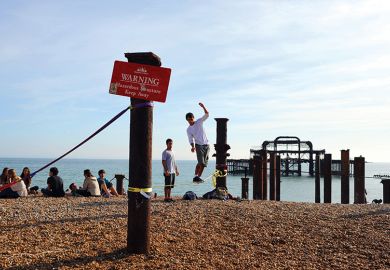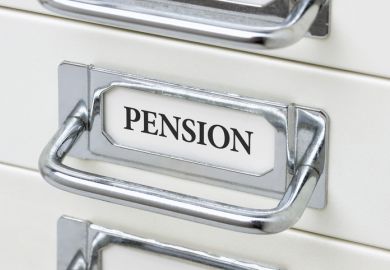The leader of the UK’s main higher education union has said that the idea that staff are “desperate” to strike again “could not be further from the truth” as a new ballot on industrial action over pay and pensions was opened.
Staff at a total of 152 institutions will be balloted by the University and College Union over the next three weeks, 78 over the latest pay offer from employers, for a rise of 1.5 per cent in 2021-22 and working conditions; six over cuts to pensions provided by the Universities Superannuation Scheme; and 68 on both issues.
The strikes, if approved by members, would be the fourth widespread walkout in the sector in little over three years.
UCU general secretary Jo Grady said universities had “prioritised tuition fee and research income” over the needs of staff and students, and added that those working in institutions were at “breaking point” over workloads that she said had only increased during the pandemic.
“The idea that staff are desperate to go on strike again could not be further from the truth but they have really been left with no other option about how they go about improving their working lives and really recapturing what working in a university and working with and for students could and should be,” she said.
She said that unless strike action – which could take place this term if there is a vote in favour – was taken, then the union was concerned that the sector could drift towards local pay bargaining in the future.
“In higher education we still have UK-wide collective bargaining. Most of the unions in other sectors lost this decades ago and we are really concerned that actually HE employers are seeking to remove that type of bargaining from us,” she said.
“We believe that if we aren’t willing to take strong industrial action we will lose it. Employers have started talking recently and publicly about the move to local bargaining. If they do that, we know universities will constantly compete to drive down wages further.”
Dr Grady said she also would not have any sympathy if universities were squeezed in the upcoming government spending review and claims this would make it even harder to increase pay as a result.
She said there had been “a strategic choice by universities to spend less of their money on their staff. And that has been happening systematically over many years. That is because they have been redirecting and funnelling that money to other parts of the institution.”
The UCU claims pay for university staff has fallen by 17.6 per cent relative to inflation between 2009 and 2019. Employers’ 1.5 per cent offer – which they say is “fair and meaningful” and includes additional rises for the lowest-paid staff – was implemented on 1 August. But it falls short of UCU’s demand for a £2,500 pay increase.
The cuts to USS pension benefits, now approved by the fund’s board but subject to a consultation, would avert a massive hike in employer and employee contributions, but the UCU claims they could reduce employees’ guaranteed benefits by as much as 35 per cent.
Raj Jethwa, chief executive of the Universities and Colleges Employers Association, said it was “very disappointing that UCU is starting yet another campaign to encourage its members to cause disruption for students through potentially damaging industrial action”.
“It is disheartening that UCU did not allow their members, representing a minority of employees, the chance to accept or refuse the offer on pay, equality, contracts and workload, at any stage in recent months,” he said.
“Instead, the lengthy delay for a UCU ballot and strike action over the past months has clearly targeted the autumn term and our students, just when we are finally back on campus.
“The final offer from employers was fair and meaningful in the context of the sector’s ongoing delicate financial situation. We very much hope the trade union members understand the considerable pressures which continue to face their HE institutions.”
Register to continue
Why register?
- Registration is free and only takes a moment
- Once registered, you can read 3 articles a month
- Sign up for our newsletter
Subscribe
Or subscribe for unlimited access to:
- Unlimited access to news, views, insights & reviews
- Digital editions
- Digital access to THE’s university and college rankings analysis
Already registered or a current subscriber?








